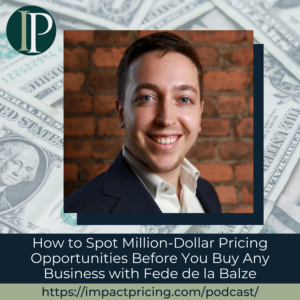Anton Malygin is a seasoned executive with years of experience building new capabilities and driving enterprise transformation in Fortune 1000 companies, focusing on revenue growth, new business models, pricing strategies, price and revenue management, commercial excellence, profitability improvement, market intelligence, customer experience, and business transformation.
In this episode, Anton shares how knowledge of different industries helps you become an effective pricing person as you are exposed to different pricing strategies and issues. As pricing is important to the company, so is the pricing team, thus, he also talks about what important skill sets one should possess to fill in the crucial role in pricing.
Podcast: Play in new window | Download
Why you have to check out today’s podcast:
- Find out the three pillars that a great pricing professional should be skilled in to enrich the pricing function of the company and ensure its success on a larger scale
- Find out how the Finance department complements Pricing people in terms of achieving a company’s overall pricing strategy
- Learn about what encompasses pricing strategy to meet a company’s long-term goal
“Stay relevant to the organization. If you will stop being relevant in your organization that’s going to be the end of pricing discipline in the company.”
– Anton Malygin
Increase Your Pricing Knowledge: Become a Champions of Value INSIDER!
To sign up go to insider.championsofvalue.com
Topics Covered:
01:13 – What led Anton into Pricing
02:32 – Two types of pricing projects he does which contrasts the impact it has on customers
03:20 – Why is he staying in Pricing and what does he love about it?
04:27 – How is it working with product management or sales or marketing as a VP of Pricing and Licensing
06:01 – How do he and his team help in making people understand the value of a product
07:29 – Does he have a team of Pricing people working with him
07:57 – The three important pillars that are required of a great pricing professional
10:45 – What his team is building out at Palo Alto – in terms of being a pricing consultant or one that sets the price
12:37 – Why the Finance department is valuable and at the same time challenging
13:47 – What do Finance people focus on and what do they miss out
18:28 – Why it is important to be a thought leader
19:30 – The advantage of understanding different industry pricing issues and techniques
20:49 – What Anton’s role like in Palo Alto
21:40 – Does he have a mentor
23:24 – What important pricing lesson he likes people to know more about
24:58 – What is a pricing strategy
27:29 – Anton’s pricing advice that can impact your business
Key Takeaways:
“I see myself developing, and pricing also leads to a lot of other different opportunities, being part of the pricing organization in the company. You become one of those important centers in the organization. And it feels like you’re impacting a lot from the standpoint of the performance of the company.” – Anton Malygin
“When we engage with a product organization, we work with them side by side on development of the strategy, and the pieces that we’re bringing to the table as a pricing methodology, one of them is a value-based pricing focus.” – Anton Malygin
“The pricing person has to have good relationships and has to be a very good communicator and relationship builder with corporate management, marketing, sales, finance, etc.” – Anton Malygin
“The pricing person has to be perceived as a leader, as someone who’s knowledgeable about pricing, and that is extremely important because if a pricing professional is just average and has an average knowledge of pricing, well, she’s/he’s probably not very different from any other product manager or finance person that sometimes does the pricing or marketing.” – Anton Malygin
Connect with Anton Malygin:
Connect with Mark Stiving:
- Email: [email protected]
Full Interview Transcript
(Note: This transcript was created by an AI transcription service. Please forgive any transcription or grammatical errors. We probably sound better in real life.)
Anton Malygin
Stay relevant to the organization. If you stop being relevant in your organization, that’s going to be the end of pricing discipline in the company.
[Intro]
Mark Stiving
Welcome to Impact Pricing, the podcast where we discuss pricing, value, and the many-faceted relationship between them. I’m Mark Stiving, today is the fifth episode of the season of Pricing Executives. And today our guest is a friend of mine, Anton Malygin. Here are three things you want to know about Anton before we start. He’s a friend from PriceWaterhouseCoopers. 10 years ago, I think we met, he was VP of Revenue Management and Global Pricing for ACI, he’s currently VP of pricing and licensing for public Alto Networks. So he made that transition from consulting into the industry. Welcome, Anton.
Anton Malygin
Thank you, Mark. It’s a pleasure being part of the podcast. Thanks.
Mark Stiving
How’d you get into pricing in the first place?
Anton Malygin
You know, it happened by chance, being a consultant, you do a lot of different things. And I started my consulting career as a strategy consultant. And as a strategy person, you’re working on a lot of different types of projects, from marketing strategy to operations. And I started focusing on one of the projects, one of the first projects I actually bought was a business turnaround opportunity. And as part of the business turnaround opportunity, we started focusing on how to improve the pricing performance of the company to impact the margins. And that’s when I came across pricing for the first time, right. Once I’ve done that project, then there were some other ones that followed, and I started doing a lot of work across different industries, whether it was high-tech, consumer goods, healthcare. It was a really exciting time, you know, and I was focusing both on pricing and revenue management.
Mark Stiving
A lot of people who fall into pricing find that the first time they did a pricing project, it was so impactful to the company that they said, ‘Oh, this is where I need to be. This is what I need to do.’ How did the pricing projects you did impact your customers? How does that compare to other types of projects?
Anton Malygin
It depends. So when I was a consultant, there were two types of projects, the ones where you just develop a strategy, you develop a strategy, you give your presentation, and you walk away, and you don’t even know what happened after, right. So whether they took your strategy, whether they did something with it, you know, or how they would implement it, there are other types of projects that you actually stay on as a consultant and help implement your pricing and those work are the most exciting because they really show the power of pricing and the pricing levers in the organization. And that’s what actually also tried to create your pricing discipline because I could see that among many consulting projects I did in my life, pricing was probably one of the most impacted.
Mark Stiving
Yeah. So why do you stay in pricing?
Anton Malygin
That’s what I love. That’s what, you know, I have been focusing on for the last 10 years. And that’s where I see myself developing, and pricing also leads to a lot of other different opportunities, you know, being part of the pricing organization in the company like Palo Alto Networks, or ACI or any other high-tech company puts you in the middle of a lot of different disciplines, right. So I work with the product management team, I work with marketing, I work with sales and I work with finance. I’m very close to our executive team. So you basically become one of those important centers in the organization. And it feels like you’re impacting actually a lot from the standpoint of the performance of the company.
Mark Stiving
I think that’s absolutely true. And you got this big title, right? You’re VP of Pricing and Licensing, and yet you go to product management or sales or marketing, you don’t get to tell them what to do.
Anton Malygin
Yes, you don’t tell them what to do. But you, you work very close with them on defining what this strategy is going to be. You know, from my standpoint, you know, I look at pricing as an enabler of sales, first and foremost, right? It has to enable sales organization and sales people usually come to you with requests. They’re asking for help. They’re asking for the enablement and they also understand that help has to come with a benefit to the organization. Not with all the cost, right? And that’s what you’re focusing on, right? You basically try to help them to find the optimal solutions, so to speak. Marketing is an interesting animal, too. Marketing people usually come to you or to me, you know, with no idea what the pricing is, they talk all about the promotions. And, you know, the promotion, usually what it means is discounting. And you really need to think through in terms of what type of behavior is going to drive and what impact on the company is going to have, right? And you have to work through that analysis with them, which they typically don’t.
Mark Stiving
How much of your role or your team’s role is around teaching people about value, helping them understand what value means to the customer and the products we build, marketing messages we put out. So how much do you focus on value versus setting a price or determining the number put on the product?
Anton Malygin
It is an essential part of any pricing strategy project or work in a cycle. I have a hard time of calling it a project since I’m working for a high-tech company, you know, but it is a project in itself, right? Because we are helping the product organizations and products equal to develop a pricing strategy for a particular quarter. So when we engage with a product organization, we actually work with them side by side on development of the strategy, and the pieces that we’re bringing to the table as a pricing methodology, one of them is a value-based pricing focus, right? So we help them to deal with value models. We help them to really understand how to position the product compared to the competitors, how to price it, compared to the competitors, and then we drive into the nuances of the pricing modeling structures, you know, as a follow up so, it’s part of every single study.
Mark Stiving
I find, in my working with companies, the lack of understanding of value is so much more important than trying to put a number on a product.
Anton Malygin
I think it’s very difficult to determine the value of the product, very difficult. And I think that’s one of the biggest challenges that our companies, especially in differentiating value.
Mark Stiving
Yeah, absolutely, absolutely. Let’s talk about the pricing people for a second. Do you have a team of people that work with you?
Anton Malygin
I just started building the team at Palo Alto Networks, you know, so when I joined Palo Alto, it was right before I COVID. And so I started building the team and then COVID came, we put everything on hold. And as we just opened up our budget for FY21 I got permission to start building this team.
Mark Stiving
Okay. So in the past, you’ve had teams as well. So, describe to me a pricing professional that you think is doing a phenomenal job. What are the characteristics, what are the types of things that that person does?
Anton Malygin
So, the number one is communication. So number one is communication with different parts of the organization. The person has to have good relationships and has to be a very good communicator and relationship builder with corporate management, marketing, sales, finance, etc. That’s first and foremost, the second piece, you know, I would say, which is very, very important is driving the pricing stats in the organization. So, because the person has to be perceived as a leader, as someone who’s knowledgeable about pricing, and that is extremely important because if a pricing professional is just average and has an average knowledge of pricing, well, he’s probably not very different from any other product manager or finance person that sometimes does the pricing or marketing. So you have to differentiate yourself from the knowledge standpoint, from the methodology standpoint. And also, you know, so I think that’s the second aspect. The third aspect is actually managing the stats. The pricing professionals have to be very good project managers because each pricing study is a project that involves multiple parts of the organization. So those three pillars I think will be the most important.
Mark Stiving
Of the three that you talk about. I think communication is really important. I’m completely with you, and pricing people, I think of us, I’m going to say that this way, think of us as kind of geeks, logical engineers, love numbers and spreadsheets. And the communication part is the part that doesn’t come naturally. We actually have to work hard at it to make something happen to get better. So I can see why that would be such a big deal. One of the things that I often see in industry and companies that have pricing departments, is the pricing department kind of acts like an internal consultant. In fact, it feels like there are two different ways that companies work either I got my pricing team that’s an internal consultant, or my pricing team is actually setting prices. How do you see what you’re building at Palo Alto Networks?
Anton Malygin
It’s the same thing. I feel that’s exactly what’s happening in the organization. So in my previous company at ACI worldwide, we were an internal consultancy organization that focused on pricing revenue management issues and managed any type of project that will be related to the profitability or pricing performance of the company. Here at Palo Alto Networks is a little bit different right now, because my organization is smaller and I’m just penetrating into the company and so, while we are focusing on the pricing strategy, I see that we also competing with internal consulting groups and the finance function that is also given sometimes, they account for the pricing function, you know, so to speak, right. And our goal is really to try to consolidate all the pricing and recommendations under one umbrella, you know, because you want to have a good methodology, you want to have a good approach, you want to have consistency. And not only that, you know, I think the key in all these different projects, because, once you do the project, there is always a follow up whether it’s a year later or two years later and who is going to do that? Those consultants that came from the strategy, you know, side of the business, or the finance is probably going to be a pricing organization.
Mark Stiving
I tend to love finance departments for running metrics and keeping track of things and letting me know what’s happening in the company. But they tend not to be driving value. They don’t think about value. And so I love them in terms of using them for doing our metrics for keeping track of what’s going on and maybe even letting us know how to do the follow-up. What do you think of that?
Anton Malygin
For me, the Finance department, as you said, is very valuable because they own the data, they can bring you the data that you currently don’t have. The biggest challenge with finance departments, they don’t understand and don’t know how to structure the data to create a pricing story, right? So what I find in organizations very frequently is one, people are collecting discount information, others are collecting wind loss information. So people will collect the competitor or the price level information, and all that is in different parts of the organization. Nobody brings all these pieces together to create actually an end-to-end pricing story, what is happening with the business? And I think that’s the role of the pricing function. You know, from my standpoint.
Mark Stiving
I think that’s really fair. When I think of Finance, I think of ‘Okay, I’m going out and I’ve done a project, I think I’m going to be moving ASP up, or I think I’m gonna be changing the wind loss number.’ I want Finance to be tracking that for me. Right? I want to get those reports so I can see if it’s actually happening.
Anton Malygin
Yeah, you know, what I also find is that Finance, it’s very easy for them, there are so many different examples. You know, they will come to the business and say, ‘We think that we should eliminate X, Y, Z discount or some other discount.’ Right? Okay, we can, what’re the implications? So first of all, you know, do we understand what value that discount brings to the organization? What the implication from the competitor’s standpoint is going to be? What implications from the customer behavior standpoint, that’s going to result in, you know, for the Finance, you know, they’re only looking at the bottom line number, and they frequently miss the content behind the numbers as a result.
Mark Stiving
Yeah, that’s absolutely true. And as soon as you said, what’s the result of eliminating that discount? What jumped into my mind is margins go up. Isn’t that what we want?
Anton Malygin
On a percentage basis? Of course, they will. How about from the total dollar perspective? Then we’ll have to see what the impact of that is going to be. Yeah.
Advertisement
Let’s talk about your career. You have one boss, but you have to work with many different departments. You have great ideas, but you can’t seem to get them adopted. Face it, you want to earn a promotion. The solution could be the insider program, championsofvalue.com. For only $100 a month, you’ll have access to all of our online courses, you’ll have access to me through office hours, and you’ll become part of a network of peers helping each other out as well. Sure, you’ll learn more about pricing, but what you’re really learning is pricing leadership. What does it take? How do you do it? You won’t get promoted just doing your job. Join us to learn how to become influential. Isn’t it worth $100 a month to work towards your promotion? Heck, if your company has a training budget, you can probably access that. Once you’ve internalized these concepts around value, you will become unique, respected, and promotable. Come join us at insiders.championsofvalue.com.
Mark Stiving
So describe for me the person, the type of pricing person that you think should be promoted, or that you would promote in your organization.
Anton Malygin
Well, Mark, I think it’s the person that as I said, that exhibits those three characteristics that I shared with you. And these are the people that I’m seeking, as part of my organization. You know, I’m also looking for people that will be very good in terms of the numbers, you know, the pricing person is a very unique individual, right? You know, has to be good with numbers, as you said, right. He needs to understand the financial statements, he needs to do the analysis and financial modeling, but also at the same time he needs to understand the business, and how those numbers will translate into or reflect the business environment. And that’s what makes pricing individuals be very successful. You know, and from my standpoint is that the people that I promote and people that have been successful as part of my organizations are the ones that will do analysis on their own, that are very, also very interested in learning and applying different pricing techniques. And you know, if those individuals are, you know, using those, you know, that learning and new pricing techniques to drive the pricing projects and everything else that results in the success, it results in the success, you know, for your organization, it results in the success of the company but also enriches the whole pricing function of their company. And that’s, to me, that’s what I typically try to encourage.
Mark Stiving
Yeah, when I look at the three that you gave us, which were communications, driving pricing projects, and then managing the studies. I like the second one the best. Right? And I say that because I, it feels to me like that differentiates people. There are people who do their job because they were asked to do their job. And then there are people who say, I’m going to go figure out what we could do better. Yeah. And I think that that’s the people who drive things.
Anton Malygin
Well, you know, it’s a very interesting thing. You know, what I have seen, at least in the high-tech industry, you know, because I talked to for the last year, as I was interviewing for my function at Palo Alto Networks, I interviewed individuals from multiple different companies, you know, in the high tech space, in what I have observed that if you lose the relevance, right, if you lose the edge, if you lose the knowledge of the pricing, if you lose the value add that you actually generate as a pricing professional, it’s the story of the pricing function period, right? So the organizations usually build the pricing function, they try to invest, but if they don’t see the value, they basically just bundle that function at the end of the day. So from my standpoint, it is always important to be a thought leader, from the pricing side and create differentiation. Then apply your knowledge, you know, obviously, in the organization to make sure that you make the difference.
Mark Stiving
Do you think when you say being a thought leader, I often get the feeling that people who work in the industry, think pricing is what their industry is, and they don’t go outside that much where you had this huge advantage where you came from consulting and saw so many different industries and pricing techniques and issues.
Anton Malygin
You know, I think we all as pricing professionals, were facing this challenge. You know, it’s not only from the industry so you go into the company and you find that how all the executive management team thinks that they have the best prices in the world? Right. And it’s very difficult to convince them, you know, that they should be leaving the pricing thinking, you know, to someone else instead of driving it themselves. And I saw that again and again, in many different organizations, you know, unfortunate, right. But I think it’s driven by the fact because it has been such a huge vacuum from the pricing standpoint that the leaders have to step in and do that.
Mark Stiving
I think the other thing that happens though, this is true with every company, if a leader is successful, then the leader thinks they know what they’re doing. And so why would I give up this really important thing?
Anton Malygin
That’s correct. You know, in many cases, I can tell you why we do a lot of different studies, you know, this even in Palo Alto Networks or you know, at ACI. It’s not always we can convince the executive leadership, I think our role is basically to develop the proposal or recommendation and have a discussion around this. Right, you know, and hopefully the company, you know, is going to come up with an optimal solution, and from my standpoint, in some cases, even if we don’t, right, at least we know what our options are, and we can closely monitor the pricing performance, you know, in the future, so that if the situation will get worse, we can always revisit.
Mark Stiving
Yeah, I think that’s great. Let’s talk a little bit about mentors. Did you have any mentors as you were growing up in the pricing world?
Anton Malygin
Unfortunately, not. No mentors. I have been a mentor myself, you know because a lot of people would reach out to me and asked me to help them to develop some of the pricing skills right. Obviously I try to be a mentor to my employees, first and foremost. Because, you know, we bring people into the organization that very frequently don’t have any pricing stories whatsoever. So how do you develop that? How do you actually become a pricing professional? How do you enrich your skillset, you know, and so I try to develop that journey map for every single employee of my organization. But personally, I never had a mentor, you know, and probably it’s my fault because I’ve never sought one.
Mark Stiving
I think it’s a valid point that you have to go seek out a mentor or at least be open to listening to people and asking them questions. So yeah, I don’t think I ever sought out a mentor, but I was lucky enough to have a couple fall in my lap. That really, really helped me. I’m glad that you’re mentoring your people. You are probably gonna give me the exact same answer. But are there any pricing lessons that you wish more people knew?
Anton Malygin
The pricing lessons. Let me ask you, can you clarify that question? What do you mean pricing lessons?
Mark Stiving
Anything about pricing? Anything that says, I wish more people understood…
Anton Malygin
Well, so let me tell you one thing. First and foremost thing. It’s an interesting question. You know, from my standpoint, you know, when I interview people the first question to ask, what is a pricing strategy? And I can guarantee when you ask that question, you are going to get as many answers as you actually ask that question. You know, and I think we as pricing professionals, we actually need to define what that means, clearly define what that means. I don’t think there is a clear definition out there. There are multiple definitions of the pricing strategy. And so a lot of people actually have a misconception of what the pricing strategy is. The biggest challenge from my standpoint on that is that if we as a pricing professional can define it, what do you think if, you know, about the people that think they know Pricing, like product managers like marketing, right, they cannot define what a pricing strategy is, you know, and that’s the biggest challenge that I have encountered, at least in my world, and I wish people knew more about.
Mark Stiving
Okay, I got to tell you, Anton, as soon as you asked that question, I was so afraid you are going to say, Mark, what do you think of pricing strategy? Because I don’t know how to answer the question. I’ve never thought about that. But everybody here listening is saying, someone, answer the question. So Anton, what do you think a pricing strategy is?
Anton Malygin
From my standpoint, I never asked myself that question. Now, I stumbled into that. But I did find, you know, pricing strategy is basically, as a pricing model, it’s a process of defining the pricing need or the pricing model, the pricing structures with an objective to maximize the revenue and margins of the company. That’s kind of how I define it. And probably I will throw into the definition or the commercial terms there as well. Because to me that actually wraps around the whole pricing strategy altogether. So that’s kind of how I define it is more technical versus anything else. It obviously will include the price positioning in all price levels.
Mark Stiving
So now that you gave me enough time to think about it, thank you, I would think that pricing strategy is the long-term decision that we have to make, not the short-term tweaks. And if I were to give you examples, there would be things like, do we do price segmentation? What is our price positioning? Are we going to be a high-price brand or a low-price brand or a low-price leader? Do we do a promotion? Is it an EDLP thing or a high-low type pricing thing? So I think these are long term decisions more than I need to adjust the price today or today we’re going to put on this promotion. Those are much more tactical type decisions.
Anton Malygin
Yeah, absolutely. That’s why I’m throwing out there the pricing needed, the pricing model and the structures, the bundling, right? Because that’s all long-term aspects of pricing. That’s all long-term structures of pricing. Promotions could be long-term, but primarily it’s short-term and I encountered people, they come to me and say, promotions is not pricing at all. So leave it to somebody else.
Mark Stiving
Okay, good. Hey, I’m having so much fun but we’re running out of time. I gotta ask the final question, though. What’s one piece of pricing advice you would give our listeners that you think could have a big impact on their business?
Anton Malygin
I think the biggest pricing advice I would give is, it’s not, how to say it, it’s not the approach, right? You know, it’s not something that you will need to or look at your business, you know, but from my standpoint, is, stay around, stay relevant in the organization. If you will stop being relevant in your organization, that’s going to be the end of all the pricing discipline in the company. You know, constantly look for opportunities. Don’t only limit yourself to pricing, because pricing is actually a much broader discipline. It’s actually revenue management. It’s value management in the organization chair. Right? And so that’s kind of how you have to look at the price, a little broader and stay relevant. That will be my advice.
Mark Stiving
Absolutely brilliant answer. Thank you very much.
Anton Malygin
You’re very welcome.
Mark Stiving
So, Anton, thanks for your time today. If anybody wants to contact you, how can they do that?
Anton Malygin
LinkedIn, that’s the best way to do that. So they can find me on LinkedIn. I will be more than happy to respond to anyone.
Mark Stiving
Okay, we’ll certainly have your LinkedIn, your name spelled properly in the profile. Alright, Episode 85, all done. This is the time in the show where I asked you very nicely to please leave us a review. These are very valuable to us. A good friend and coach, Wendy, left the review on Apple podcasts as:
“Great info. Mark has a great way of explaining the business of pricing. I learned something new I can use every time. His wisdom has saved me from some expensive errors. Thanks, Mark.”
Well, actually, thanks, Wendy. I appreciate that. Also, don’t forget to join us in our free community, at championsofvalue.com. That’s where you see all of the free content that I put out, the blogs, the videos, the podcasts, the memes, you won’t miss anything that way. And as always, if you have any questions or comments about this podcast or about pricing in general, feel free to email me [email protected]. Now, go make an impact!
Tags: Accelerate Your Subscription Business, ask a pricing expert, pricing metrics, pricing strategy
















